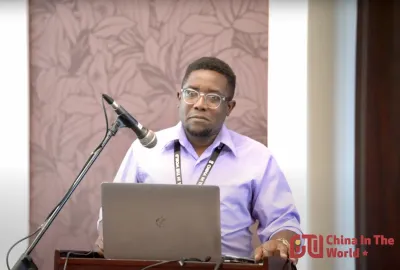
Gregory Gondwe
Contact
Office Hours
Bio
Dr. Gregory Gondwe is an Assistant Professor of Journalism and Emerging Media Technologies at California State University, San Bernardino, and a Faculty Associate at Harvard University’s Berkman Klein Center for Internet & Society, where he previously served as a Visiting Scholar with the Institute for Rebooting Social Media (RSM). As a scholar of journalism and technology, Dr. Gondwe examines how media practices unfold at the intersection of digital innovation and geopolitical influence. His research focuses on two key areas: (1) the adoption and implications of emerging technologies in journalism, particularly within the Global South, and (2) the competitive interactions between African media and powerful foreign outlets, notably those from China and the West. In his work, Dr. Gondwe applies computational social science methods (specializing in data cleaning, text mining, natural language processing, and statistical modeling) to investigate journalistic practices. He is experienced in evaluating algorithmic systems for bias, transparency, and narrative distortion, especially in politically sensitive contexts. His skills also include data visualization for public storytelling, audience analysis, and automated content verification. Through these methods, he equips students with ethical, data-driven frameworks to assess newsworthiness, detect misinformation, and amplify the voices of marginalized individuals. His works have been published in leading peer-reviewed journals, including Digital Journalism, Journalism Studies, Journalism Practice, Mass Communication and Society, AI & Society, Oxford Intersections, and International Journal of Communication.
Education
PhD - Media Research and Practice, University of Colorado, Boulder
MA/MS - Media Studies/Political Science, University of Oregon
BA - Mass Communication, St. Augustine University of Tanzania
Courses/Teaching
Multimedia Journalism
Explores the principles of digital storytelling using audio, video, photography, and interactive content. Students produce stories across platforms while learning key skills in editing, field production, and ethical journalism in the digital age.
Data Journalism
Introduces students to the fundamentals of collecting, analyzing, and visualizing data for storytelling. Emphasizes the use of R for statistical analysis, open data sourcing, and building data-driven narratives that serve the public interest.
Newspaper Production
A hands-on practicum course focused on the editorial, design, and publication processes of a student-run newspaper. Students engage in news gathering, layout design (e.g., using InDesign), and team-based editorial decision-making.
Global Communication
Examines the flow of information across borders, with a focus on global news agencies, media imperialism, transnational journalism, and the role of media in diplomacy, conflict, and cultural exchange.
Media Law and Ethics
Analyzes the legal responsibilities and ethical dilemmas faced by media professionals. Topics include censorship, journalistic integrity, digital privacy, and emerging issues in AI and algorithmic accountability.
Social Media and Society
Explores how social media platforms shape identity, discourse, activism, and power dynamics. Students critically analyze trends such as influencer culture, misinformation, and algorithmic governance.
Communication Law and Policy
Provides a comprehensive overview of legal and regulatory issues in communication, including freedom of expression, defamation, privacy, copyright, and the evolving policies shaping digital and AI-mediated communication.
AI in the Newsroom
Investigates the integration of artificial intelligence in journalistic workflows. Topics include algorithmic news curation, automation, bias detection, ethical implications, and the role of journalists as interpreters and mediators of AI systems.
Mass Communication and Society
Explores the historical and contemporary relationship between mass media and society. Focuses on media effects, audience reception, and the socio-political roles of journalism and entertainment media.
Computational Methods
Introduces students to computational techniques used in media and communication research. Emphasis is placed on using R for text analysis, data scraping, and social media analytics within a research design framework.
Quantitative Methods
Covers statistical techniques for communication research, including survey design, hypothesis testing, regression analysis, and ANOVA, with hands-on exercises using R to analyze real-world datasets.
Qualitative Methods
Focuses on in-depth methods, including interviews, focus groups, discourse analysis, and ethnography. Students learn to design, conduct, and analyze qualitative research in communication contexts.
Media and Democracy
Examines the media’s role in shaping democratic processes, with emphasis on freedom of the press, information access, political communication, and media trust in both Western and non-Western contexts.
Research and Teaching Interests
In my research endeavors, I explore the intersection between journalism, artificial intelligence, and global power structures, with a particular focus on the Global South. I examine how emerging technologies are reshaping news production, editorial decision-making, and audience trust, especially in Sub-Saharan Africa, where digital systems intersect with local epistemologies, infrastructural constraints, and geopolitical influence. My work interrogates how journalists are not only content creators but also ethical mediators who reconfigure AI outputs to preserve cultural meaning and narrative sovereignty.
I am especially interested in how algorithmic content curation during politically sensitive moments can reinforce or disrupt entrenched power hierarchies. My recent studies analyze the influence of Chinese and Western media on African news ecosystems, highlighting the asymmetries of information control and the strategies African journalists employ to reclaim narrative agency. I also investigate how disinformation and deepfakes circulate through encrypted platforms such as WhatsApp, and how grassroots actors mobilize counter-algorithmic resistance.
In addition, I contribute to theoretical conversations around digital divides, thus shifting the focus from access to digital literacy and epistemic agency. My theoretical concept of TechAnimism offers a framework for understanding how African journalists and communities engage with machines not only functionally but relationally, embedding technology within cultural, ancestral, and spiritual contexts.
Methodologically, I use a mixed-methods approach grounded in computational social science. I employ R for text mining, natural language processing, sentiment analysis, and statistical modeling, while also drawing on qualitative techniques such as ethnographic observation, in-depth interviews, and discourse analysis. Across these strands, my research advances critical conversations on algorithmic accountability, media ethics, and the decolonization of digital infrastructures.